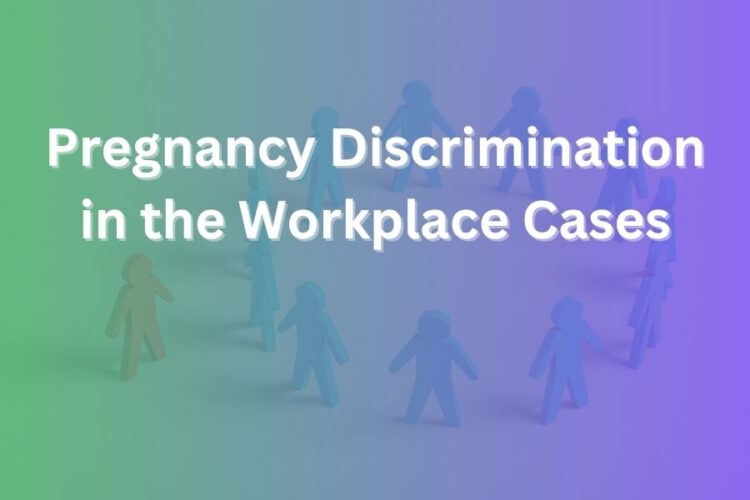Facing pregnancy discrimination at work can feel isolating and unfair. You might be denied the same accommodations other employees receive, demoted after announcing your pregnancy, or even pressured to resign when you should be preparing for your new baby.
This article offers an in-depth look at pregnancy discrimination in the workplace cases from a U.S. context and explains what you can do. In this article you will learn about key laws, landmark case examples, common forms of discrimination, how to document your claim, and what to expect moving forward.
Understanding the Legal Framework
Pregnancy discrimination is illegal under federal law. The primary protections include the Pregnancy Discrimination Act (PDA), the Pregnant Workers Fairness Act (PWFA) and the enforcement efforts of the Equal Employment Opportunity Commission (EEOC).
The PDA, enacted in 1978, amended the Civil Rights Act of 1964 to mandate that pregnant workers be treated the same as others with similar work limitations. The EEOC states that pregnancy, childbirth, or related medical conditions must be treated as gender-based discrimination when handled unfairly.
Starting in fiscal year 2011, the EEOC filed 44 lawsuits involving pregnancy discrimination under Title VII and the PDA. Over that time, it has recovered around $4.4 million in relief for victims of pregnancy discrimination through litigation.
The more recent PWFA further clarifies that employers must provide reasonable accommodations to pregnant or postpartum workers — for example, light duty, frequent breaks, or schedule changes — unless doing so creates undue hardship. As a result, you now have stronger protections if you need adjustments during pregnancy.
Key Cases That Set the Standard
Several legal cases illustrate how pregnancy discrimination law functions in real life and how you can use precedent to support your claim.
One of the most important cases is Young v. United Parcel Service, Inc. (2015). In that case the U.S. Supreme Court held that a pregnant worker must show the employer refused her a requested accommodation while offering accommodations to others whose restrictions were similar. This established the so-called “accommodation refusal + others accommodated” test.
Another example: the EEOC sued a retailer after it refused a pregnant employee emergency leave despite a medical condition during pregnancy, resulting in a $205,000 settlement.
You’ll also find smaller cases — for instance, an assisted living facility recently agreed to pay $73,000 to settle a pregnancy discrimination and retaliation lawsuit.
These shape the landscape in which your individual claim exists.
Common Forms of Pregnancy Discrimination in the Workplace
Discrimination can take many forms. Here are some key patterns you should watch for:
- Refusal to hire you because you’re pregnant or plan to become pregnant. If an employer says they won’t hire you because you may need leave or reduced hours, that is discriminatory.
- Denial of accommodations that other employees receive. For example, if you ask for reduced lifting or more frequent breaks and are refused, while others get accommodations for non-pregnancy conditions.
- Being forced to take unpaid leave, demoted, or terminated after announcing pregnancy.
- Being passed over for promotion or assignments after returning from maternity leave.
- Hostile environment or negative commentary about your pregnancy or capacity. Comments about your weight, your “commitment” to work once you have a baby, or constant micro-penalties.
- Retaliation for asserting your rights. If you speak up or request protections and the employer responds by downgrading you, giving you worse shifts, or pressuring you out.
How to Document and Build Your Case
If you suspect you are facing pregnancy discrimination, build your file systematically. Here’s what you should do:
- Start with written records: keep emails, memos, performance reviews, and any documentation showing how others were treated differently.
- Document when you announced your pregnancy, when you requested accommodations, and any responses (or lack thereof) from your employer.
- Track any changes in duties, assignments, or treatment after you told the employer about your pregnancy or returned from leave.
- Note any comments, jokes, or remarks about your pregnancy or motherhood, especially if they suggest bias.
- Compare your situation to non-pregnant workers who had similar limitations or restrictions and received accommodations you were denied.
- Understand filing deadlines: typically you must file a charge with the EEOC or a state fair employment agency within a set timeframe (often 180 days, but it can vary).
- Consult an employment attorney experienced with pregnancy discrimination to assess your strength of claim and advise on strategy.
What Employers Should Be Doing — And What You Should Expect
From the employer side, best practice requires: clear policies about pregnancy accommodations, training managers and HR staff about legal obligations, and consistent treatment of pregnant employees in line with other employees with similar restrictions.
From your side, once you make your accommodation request or notify your supervisor, you should expect: a timely response, interactive dialogue about any restrictions, and a genuine effort by the employer to offer an alternative duty, leave, or schedule adjustment if needed. If you receive only a blanket refusal or a worse treatment than others in similar positions, you may have a strong claim.
Recent Statistics and Trends
Pregnancy discrimination remains a persistent problem across many U.S. workplaces. The EEOC continues to see litigation under Title VII and the PDA (and now the PWFA) on this topic. Recent settlements ranging from tens of thousands to hundreds of thousands of dollars show both the survivability of claims and the value of strong documentation.
What Happens During the Legal Process
If you file a claim with the EEOC: the agency will investigate whether there is reasonable cause. If it finds cause, it may attempt conciliation or issue a right-to-sue letter, which allows you to file in federal court.
In court, you will need to prove that you are pregnant or experienced a pregnancy-related condition, your employer treated you unfavourably because of it, and that the employer failed to treat you as well as others.
You may recover: back pay, front pay, compensatory damages (for emotional distress), and in some cases punitive damages (if conduct was egregious). The amount you recover depends on many factors including size of employer and your losses.
Practical Steps You Should Take If You Face Discrimination
- Notify your supervisor or HR in writing of your pregnancy and any restrictions your doctor has imposed.
- Request accommodations in writing — for example, lighter duty, reduced lifting, more breaks, or modified schedule.
- Keep a daily log of your work assignments, any changes to your duties, and any differential treatment you experience.
- If you feel harassed or repeatedly denied accommodations, ask for help from an employment attorney or your local fair employment agency.
- Don’t resign out of frustration without consulting an attorney — sometimes staying longer can strengthen your claim.
- File a charge in a timely manner with the EEOC or relevant state agency once you suspect discrimination.
Your Rights After Maternity Leave and Returning to Work
Pregnancy discrimination does not end when you take leave. If your employer fails to restore you to the same position, denies opportunities, or treats you worse because you returned from leave, these may also be actionable. For example, if your co-worker with a different condition returned to the same job but you did not, you may have a valid claim under the law.
What If Your Employer Retaliates?
Retaliation is also illegal. If you assert your rights — ask for accommodations, report discrimination, or participate in an investigation — your employer cannot legally punish you for doing so. Demotion, termination, reduction in hours, or forced resignation because you made such a request can all be part of a retaliation claim.
Final Advice When You’re Considering Action
Pregnancy discrimination in the workplace is unfortunately still common, but your rights are strong under federal law and many states have additional protections. You should act deliberately but quickly, document every step, and consult legal guidance if you face hostile or unfair treatment. By doing this you maximise your chance of securing relief and holding your employer accountable.
Stay confident in your right to fair treatment. If you are pregnant or returning from pregnancy, you should not face lower pay, reduced responsibilities, or biased treatment because you carry new life. You deserve equal treatment, equal opportunity, and the support you need to thrive in your role. Take control of the situation and protect your rights.










